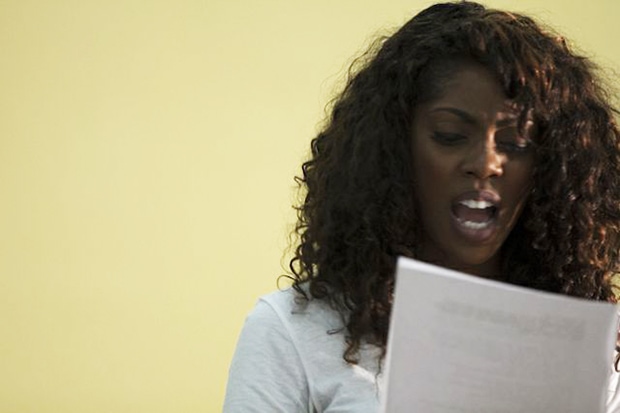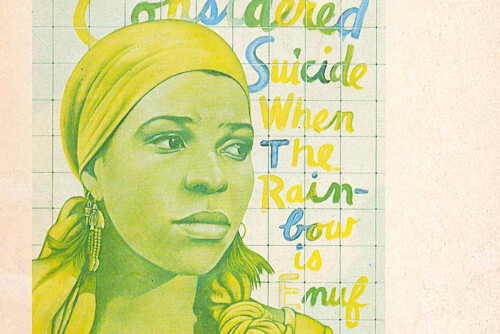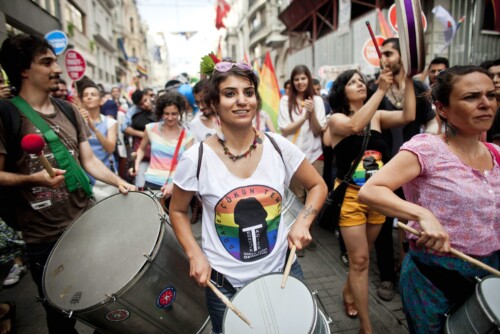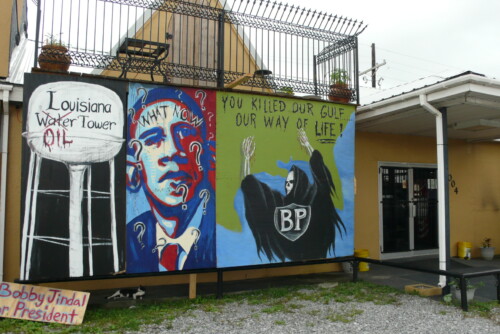Chris Cynn: Did you encounter any resistance from audiences for being a male director of a work dedicated to “colored girls”?
Wole Oguntokun: There was no resistance on account of me being a male director of for colored girls. The producers and cast felt my body of work gave me an advantage in performances like these.
Chris Cynn: Had you seen a production of for colored girls before you directed it?
Wole Oguntokun: No, I refused to.
Chris Cynn: Not just the film. But a play production—you hadn’t seen the play either?
Wole Oguntokun: Oh, yeah, yeah. I actually saw bits of the play. Someone brought a video for me. It was a bit of stage and—it wasn’t Tyler Perry’s film. It was bit of stage and film.1 Now, I didn’t see the movie because I didn’t want to have the heavy influence of Tyler Perry in my life, at that particular moment—I didn’t want that. And there were people who met me after and said—so where’s the Lady in White? And that made me wonder. Because apparently Terry Perry had created the Lady in White. What’s her name? Whoopi Goldberg. I didn’t know that until after. But I might have been forced to have run along with that idea by having a Lady in White, if I had watched [the Perry film]. There might have been some influence on me. I didn’t see it until after.
Chris Cynn: And that would really transform the meaning of the play, right, to have a Lady in White?
Wole Oguntokun: Well, he’s a director. And honestly, I write plays and pieces, too, and I know that all writers have … most writers have a problem with their works being touched, but I speak now from a viewpoint of a director: anything can be done to your work, as long as the story is told.
I was just glad I didn’t see that movie because I might have thought: what is the possibility of creating another lady? I was glad that idea wasn’t foisted on me by Mr. Perry. But as a director, I think people are allowed to change whatever they want, or to turn a play on its head, if they think it would make a more interesting story, and it will tell the story better.
Chris Cynn: Is there anything else about the play, about Shange, that you would want to add?
Wole Oguntokun: I remember you asked if there were some circumstances in 2011, around that time, that would have, maybe, been a catalyst for the choice of that particular play. So maybe I should address that properly now. What I want to say is, the story of women is, how do you say it—the “problems”—in quotes, are things that have gone on through time. So basically it was why Ntozake’s work was important at that time. Women have faced problems from the beginning of time. They have had issues of subjugation. Well, we all know what women face. We know the natural obstacles that are thrown their way, and that’s why that play was chosen. I’m going to get a bit political here. It’s a bit like, women have problems; women have things that trouble them; women have ceilings that are designed to prevent them from crossing over, and it’s always a fight to get them across. It’s a bit like the black man in the world—and this is not the angry black man speaking now—it’s a bit like the black man, the African male in the world. There are some problems that are peculiar to him. You understand?
Chris Cynn: But what about black women in the world?
Wole Oguntokun: Oh, yeah, they do have their issues too. I’ll just give you an example. The problem faced by the black female, by the African female here, actually may be a bit more pronounced than those faced by the American female. So basically Ntozake’s work cannot actually totally blanket … it cannot totally encompass all the troubles that women face. Because even in the ranks of those women, there are categories of troubles, if you get my meaning.
The mortality rate, for example, in Africa … the infant mortality rate here is something the American mind will never be able to understand. It would be totally incomprehensible, so those are African issues that cannot be addressed because, I mean, you can’t talk about a scar if you have never felt a wound. It’s not possible. So that’s me going deeper into the story. Not taking anything away from Ntozake’s work, of course.
Chris Cynn: So for you, she did address some of the issues, but because of the nature of the work and its specific American-ness, it was unable to actually convey some of the most pressing issues that you feel actually are confronting African women, or Nigerian women in particular, or many of them, anyway.
Wole Oguntokun: No, no, Chris. I have to be careful here. What I’m saying, Chris, is—yes, I have a degree in law [laughter]—what I’m saying is that there are sub-chambers, even though she did so brilliantly in her work, even though her work was so brilliant … there are sub-chambers into which Ntozake might not have been given entrance because she never experienced those things. So there are many sub-chambers, there are rooms underneath. There are cities under the cities, which Ntozake might not have been able to reach. She hasn’t experienced it. For her, it would be incomprehensible. Where do children die on the streets? It doesn’t happen, except in Africa.
Chris Cynn: I really like that metaphor of the cities under the cities, because she sets the play in specific cities—Detroit, New York, very American cities. This notion of cities under cities …
Wole Oguntokun: Ah, exactly.
Chris Cynn: … in Lagos, or Abidjan, or any place. I really like that metaphor.
bWole Oguntokun: Thank you. The actor who took that particular piece about the cities, about the square mile of cities, grew up in the UK, she grew up in England. That’s the person who took it here, Marcy Dolapo Oni,2 she grew up in the UK, and I told her: before you can speak like someone who knows the city, you have to walk the streets of this city as well. You have to experience what the people, what the, in quotes, the “ghettos” of Lagos are like. So even the person who took that part here, had no idea what some things were like until we touched the play. She had no idea what the city under her own city was like. She had no idea that her city had layers, so to say.

Chris Cynn: Did you feel like the play that you directed was able to convey to audiences … and I mean, I would imagine that the audiences are maybe not dissimilar to the audiences here, where mostly the elite tend to go to the theater, just because of the price and because of the connotations of “the theater”? I don’t know if that’s different for attendance in your play.
I was interested in what you just said about how even some of the people who were involved in the play were not aware of some of the most marginalized in their own city. I’m wondering if the audiences who came to your play also might not have been aware of that either—probably not on a daily level—of the lives of those who are depicted in the play. And there’s a way in which the play seems to address, and maybe, in a really complicated way, engage in what it means, that elites are watching representations of the most marginalized. I’m thinking about Sechita when she is dancing and seems to be deriving pleasure in criticizing and defying the audience’s gaze. At the time of the play’s initial Broadway production in 1976, too, audiences were also mostly white. I’m wondering whether you were trying to convey some of the complexities of that relationship between actors representing the most marginalized and the elite audience, and how some of those complexities translated?
Wole Oguntokun: Yeah, I tried as much as I could to show there was a world different from the things we take for granted. I tried as much as I could. Now, the peculiar thing about the theater audience is that people come for different reasons. Some come because they think it’s an event. Some come because they want to see art. And some would have come because it was Ntozake’s classic piece, for colored girls who have considered suicide / when the rainbow is enuf. Theatre does have an audience that appears elitist. We had an actress, Funke Akindele, who is known for her films on the more marginalized in the society, take on some portions of the 2014 production of for colored girls, where the performer seems to openly defy the audience’s judgment of her and declares that she is in their faces and is staying there.3
Now, I think, what I try to do is to change the world, a play at a time. That’s going to take a very long while … to change the world a play at a time. I left home quite late today because I was watching a documentary on cable TV. It was titled Great Africans, and it was on the life of Patrice Lumumba.4 I, honestly, this morning could not understand how people could make discussions on hair or shoes or things, when things like—I was really upset this morning—when things like the assassination of Lumumba happened. Nobody ever talks about things like that.
I directed a play about the Congo, here at the Black Heritage Festival a few years ago.5 Professor Wole Soyinka called me to the Black Heritage Festival and asked me to direct that, and that’s the first time I actually came across the story of Lumumba. What I’m saying is, audiences are peculiar, and I don’t want to speak from a position of arrogance, but people … sometimes the most important things just pass over them.
The best you can do is just hope that it reaches a few people. I think for quite a number of people, it doesn’t matter how profound what you have done is. It just washes over them like water, and they move on. What I’m saying is, this morning—I give the Lumumba example because I was immobilized for a few minutes after the film—I just thought, “this … this happened, and nothing came out of it.”
Okay, I get very political when it comes to these things. I get worked up.
Chris Cynn: But you clearly have a firm conviction in the power of theater. I mean, it’s what you do.
Wole Oguntokun: Oh, yeah. Oh, yes, I do. I think it’s a chronicle, it’s a way, particularly in this part of the world, it’s a way of chronicling history. You have to continue to do those things so that people don’t forget. Or you take examples, like Ntozake Shange’s work, and you bring it into our own context, so that people can see the world through the eyes of others. They can see their world through the eyes of others. They can see the things that a lot of people don’t think, basically. So I think theater tries to shake them out of complacency and tries to make them remember that there is trouble out there.
Chris Cynn: I like that: there’s trouble out there. That’ll be the title of the interview. [Laughter]. Thank you so much.
Wole Oguntokun: Thank you.
- The Broadway production of for colored girls filmed in 1982. for colored girls who have considered suicide / when the rainbow is enuf, dir. Oz Scott, perf. Alfre Woodard, Lynn Whitfield, and Ntozake Shange. Broadway Theatre Archive, 1982. [↩]
- Oni is an actress who was also one of the stars of for colored girls. [↩]
- Akindele played the lady in orange in the 2014 production of for colored girls. [↩]
- Patrice Lumumba was the Congolese independence leader and Prime Minister, imprisoned and executed in 1961. On his murder, and Belgian and United States governments’ complicity in his death, see Ludo De Witte, The Assassination of Lumumba, trans. Renee Fenby (New York: Verso, 2001); Didier Gondola, The History of Congo (Westport: Greenwood, 2002) and Georges Nzongola-Ntalaja, The Congo from Leopold to Kabila: A People’s History (New York: Zed, 2002). [↩]
- Aimé Césaire’s A Season in the Congo that Oguntokun directed for the 2010 Black Heritage Festival in Lagos. See Aimé Césaire, A Season in the Congo, trans. Gayatri Chakravorty Spivak (Chicago: U of Chicago P, 2005). [↩]




